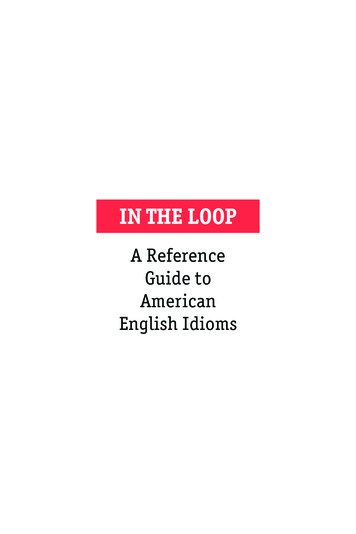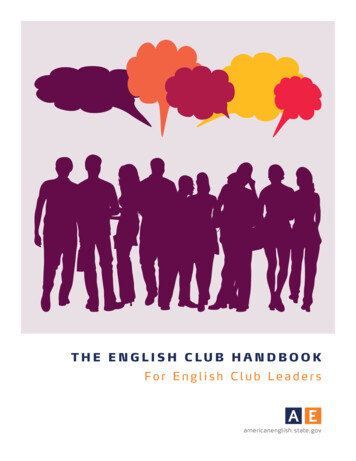
Transcription
English Idiomswith ExamplesLearn the meaning and origin of 20 common Englishidioms. Quiz included.
Why Learn Idioms?An idiom is a phrase that has a meaning which is different from the meanings ofeach individual word in it. For example, if someone says to you “I’m pulling yourleg”, you might think it is strange because you would definitely be able to feel ifsomeone was holding your leg and pulling it! This idiom actually means that theyare teasing you or playing a joke on you.There are hundreds of common English idioms in the English language which we useevery day. In fact, most English people do not even realise they are using them! Asthe meanings are usually completely different to the meanings of the actual words,it can be very difficult to learn them – you need to learn them in the same way youlearn new vocabulary.One of the most difficult aspects of learning English – or any foreign language forthat matter – is how to learn idioms. Idioms are words or phrases whose meaningcan’t be worked out from literally translating the words themselves. Therefore,learning idioms can be really quite difficult, as there are no shortcuts or patternsyou can use to help you remember them.Of course, you could always decide that you don’t need to worry about idioms –after all, it’s possible to get your point across in English without using idiomaticexpressions. However, failing to learn idioms will mean that you don’t alwaysunderstand everything you hear or read. It will also mean you miss out on the true‘colour’ and personality of the English language and British culture. If you canmaster a range of English idioms, you’ll become a more comfortable and naturalEnglish speaker, who is able to chew the fat with native English speakers that youmeet.So, while there are no quick fixes to learning idiomatic expressions, here’s a starterfor ten of things you can do to help make rememberingthem a piece of cake:Use your diaryIt’s always a good idea to keep a vocabulary diary whileyou’re learning English in London, as it gives you thechance to note down words or expressions you hear butdon’t understand. So if you hear, read or see anexpression or phrase, and you can’t work out its meaning from the words1
themselves, the chances are that it’s an idiom. Note it down and take it to your nextlesson, so you can ask your tutor what it means.Use contextWhile you can’t work out the meaning of an idiom by translating the words in thephrase, sometimes the context can give you clues to help you work it out. Forexample, if someone is talking about a day out that went wrong, if they saysomething like “it just added insult to injury,” you could use the context of hearingabout the problems and issues of the day to work out that this idiom refers tomaking the situation worse.Use the idioms you’ve learnedIf you think you’ve mastered the meaning of anidiom and the correct context in which to use it,then don’t be shy! If you see an opportunity, thenuse it, whether in conversation or in writing. It canbe nerve-wracking to use a phrase you’re not usedto, especially if you’re not completely certainwhether you’re using it correctly, but biting thebullet and doing it is the only way to really learn itsusage.A Catch-22 SituationMeaningA frustrating situation in which someone is trapped by contradictory rules. Oftenthis is a situation in which the rules and regulations actually stop a problem frombeing solved. For example, a homeless person needs to find a job so that they canafford somewhere to live, but they cannot apply for ajob because they have nowhere to live – this is aCatch-22 situation.Origin“Catch-22” comes from the title of Joseph Heller's1961 novel. In the story, “Catch-22” was a rulefollowed by army doctors in The Second World War. Ifa frightened pilot tried to avoid a dangerous mission2
by claiming he was “insane”, this was seen as healthy and the doctor woulddiagnose him as “sane” and eligible to fly.In contrast, any pilot who actually wanted to fly was marked as “insane” and wouldnot be allowed to do so. So “Catch 22” was the perfect example of anillogical rule which made everyone unhappy. After the release of a film based on thebook in 1970, the phrase “a Catch-22 situation” or “a Catch-22 fix” became widelyused to mean a paradoxical problem.ExamplesThe Sunday Times:“Catch-22 Property Crisis: Young people don’t have enoughmoney to get on the property ladder, but banks will only lend money to propertyowners.”Rob: “I’ve been looking everywhere for a job, but no-one will give me an interviewbecause I don’t have any work experience.”Rachel: It’s a Catch-22 situation – until someone offers you a job, you won’t be ableto get any experience.”Hannah: “I’ve found myself in a real Catch-22 fix – if I go back to work I can hardlymake enough money to pay for childcare, but if I stay at home to look after the babyI can hardly make enough money to pay for food and rent – either way, I’mstruggling to survive financially.”Bring Home the BaconMeaningTo earn a living/earn enough money to live on andprovide for yourself or your family.OriginThe idiom bringing home the bacon started in the 1100sin a small town in Essex. The legend goes that the vicarof the church of Dunmow would reward the couple thathadn’t argued for a whole year and a day with “a side of bacon”.The winners were considered to be role models for the community and thecompetition was designed to create harmony in the family unit.However, there are others who believe that the idiom started in the 1500s. In thosedays one of the most fascinating fairground attractions was to try and catch agreased pig with your bare hands, and whoever managed to do so would be able to3
take the prized animal home. So, if you won you would literally be bringing homethe bacon.But where does the connection to money come from? Well, if you consider that inboth stories you had to earn your prize and that money was probably short at thetime, it would be fair to say that the side of bacon represented a cash prize of sorts.Examples “This is ridiculous! I work all hours under the sun and I still can’t seemto bring home the bacon.” My husband stays home and looks after the children, and I bring homethe bacon. I always tell my children to follow their passions, but that bringinghome the bacon is also important.Cold FeetMeaningTo become nervous or frightened to do something you had planned to do.OriginThe exact origin of this idiom is unknown;however, many people believe that it is amilitary phrase. If a soldier became too scared togo into battle, he would complain that his feetwere frozen as a way to avoid fighting or toenter the battle slowly.Examples“Jason was just about to bungee jump from that bridge but he got cold feet anddidn’t do it.”“They asked me to sing at the concert last night but I couldn’t. After seeing howmany people were in the audience I got cold feet.”Sally: “Are you looking forward to your wedding tomorrow?”Anita: “Of course. I’m a bit worried about Jack though. He’s been acting strangerecently and I’m worried he’ll get cold feet and not turn up at the church!”4
Sally: “Don’t be silly, Jack loves you. I’m sure he’ll be there.”Cool as a CucumberMeaningExtremely calm, relaxed and in control of youremotions.OriginThis phrase may have originated from the fact thateven in hot weather, the inside of cucumbers areapproximately 20 degrees cooler than the outside air.Therefore, a person who stays cool, calm and relaxed in a difficult situation canbe compared to a cucumber staying cool inside, even in hot weather!Examples“I know that Tom was really nervous before his bungee jump but he lookedas cool as a cucumber.”“I don’t understand how you can stay cool as a cucumber when you givepresentations to more than 100 people. I get so nervous and I always mix up mywords.”Rob: “When is your job interview?”Sue: “Tomorrow. I’m so nervous!”Rob: “Don’t worry. Just act as cool as a cucumber and tell them you’re the bestperson for the job. You’ll be fine!”Don’t Count your Chickens Before they HatchMeaningYou shouldn’t assume that something will definitely happen before it really does.Don’t make plans based on predicted results that haven’toccurred yet. This phrase is often shortened to Don’t countyour chickens.OriginA hen (female chicken) lays eggs from which young chickens(chicks) “hatch” or emerge. However, not all eggssuccessfully produce a chicken, so you shouldn’t count theeggs and assume that each one will produce a chick – youshould wait to count the actual chickens until they have hatched.5
This phrase may have its origins with Aesop, the Greek fable writer who livedaround 620 to 560 BC. In his fable “The Milkmaid and Her Pail”, a milkmaid carries apail (bucket) of milk on her head and daydreams about selling the milk, buyingchickens with the money and then becoming so rich from selling the eggs that shebecomes independent. She will then have enough money to shake her head to sayno to all the young men trying to win her love. However, in the fable she is soimmersed in this daydream that she shakes her head and accidentally drops themilk, therefore destroying the possibility of her dream by imagining it too soon.There is a line from the fable which reads “Ah, my child,” said the mother, “Do notcount your chickens before they are hatched.”ExamplesMary:“I’m sure my boss will give me a raise next month, so I’ve decided to treatmyself to an exotic holiday.”Dennis:“If I were you I wouldn’t book the holiday until you actually get theraise don’t count your chickens ”The current Prime Minister seems pretty confident that his party will win thegeneral election in May and get re-elected. However, he shouldn’t count hischickens until they hatch.Harry: “When Liverpool wins the FA Cup, I’m going to have a huge party!”Beth: “Don’t count your chickens before they hatch! They haven’t even played thesemi-finals yet!”Eat my HatMeaningPeople say “I’ll eat my hat” when they are suresomething will not happen.OriginNo-one would want to literally eat their hat so thisexpression is only used when someone is very sureabout something. One of the earliest appearancesof this phrase was in Charles Dickens’ ‘The Pickwick Papers’ in 1837: “If I knew aslittle of life as that, I'd eat my hat and swallow the buckle whole”.There are many things that would be very difficult to eat so it is not known why ahat was chosen. However, some people think that it is because the king and hiscompanions used to wear large and elaborate hats that would have beenespecially difficult to eat!6
Examples“He's always late. If he gets here on time, I’ll eat my hat!”“My friends said they'll eat their hats if I pass my driving test!”“I’ll eat my hat if you can eat 20 burgers in one hour!”“My mum said she would eat her hat if I didn’t pass the exam but I got topmarks! I'm going to put her hat in the oven when I get home!”Give Someone the Cold ShoulderMeaningTo be unfriendly to someone and ignore them deliberately.OriginThis idiom originated in the early 1800s. It is said thatwelcome visitors to a house were served a hot mealbut someone who was not welcome was given a coldshoulder of whatever meat was being eaten. Theshoulder was known to be the coldest and toughestpart of the animal and a much inferior meal.Examples“I haven’t spoken to Susan for months. I’ve triedcalling her a few times but she keeps giving me the cold shoulder. I don’t evenknow why.”“I think you should stop giving Jeff the cold shoulder. I know he upset you but he’sreally sorry and he wants to be your friend again.”Paul: “Hi Jake. How are you feeling today?”Jake: “Hi Paul. You’re the only person who has spoken to me today. Everyone elseis giving me the cold shoulder.”Paul: “Well I’m not surprised. You were very rude to everyone last night. Don’t youremember?”Jake: “Oh no! I must have drunk too much – I don’t remember anything!”7
Hit the Sack/Hit the HayMeaningTo go to bed.OriginIn the late 19th and early 20th centuries, people usedto sleep on a cloth sack stuffed with hay. Before theywent to bed, they would literally ‘hit the hay’ to make the mattress morecomfortable and to make sure there were no bugs inside. The expression ‘hit thesack’ is thought to have originated from the sack that was stuffed with hay.Examples“I’m exhausted. I think it’s time for me to hit the sack.”“Hey Steve, you look terrible! What time did you hit the hay last night?”Claire: “Come on Paul, time for bed.”Paul: “But it’s before midnight! You don’t really think I’m going to hit the sack thisearly do you?”Claire: “Fine, but remember we have to wake up at 5 tomorrow!”Tickled PinkMeaningVery happy, delighted.Origin“Tickling” here doesn’t mean light stroking of theskin - it's the metaphorical sense of the word thatmeans 'to give pleasure’. The idea is of enjoyment great enough to make therecipient go pink with pleasure.That meaning of tickling has found its way into several phrases relating to pleasure,dating back to the early 17th century, but it was first used in 1910, in an Illinois'newspaper - The Daily Review, said in a piece titled 'Lauder Tickled at Change', wehave:8
"Grover Laudermilk was tickled pink over Kinsella's move in buying him from St.Louis."The inclusion of the term in a newspaper, without any explanation of meaning,indicates that the writer expected readers would already be familiar with it.Examples I was tickled pink to have you visit us. We were tickled pink when your flowers arrived. Aunt Sophia was tickled pink to receive a photo of the family.In a NutshellMeaningin only a few words / conciselyOriginA nutshell is the hard outer casing of a nut,which protects the edible nut inside. A nutshellhas enough space to contain something small –therefore “in a nutshell” has come to mean “in a small number of words”. It isbelieved that this idiom may have been created nearly 2000 years ago, when theRoman writer, Pliny, described a copy of Homer’s Iliad as being written so small thatit could fit in the shell of
English speaker, who is able to chew the fat with native English speakers that you meet. So, while there are no quick fixes to learning idiomatic expressions, heres a starter for ten of things you can do to help make remembering them a piece of cake: Use your diary Its always a good idea to keep a vocabulary diary while youre learning English in London, as it gives you the chance to note down .











